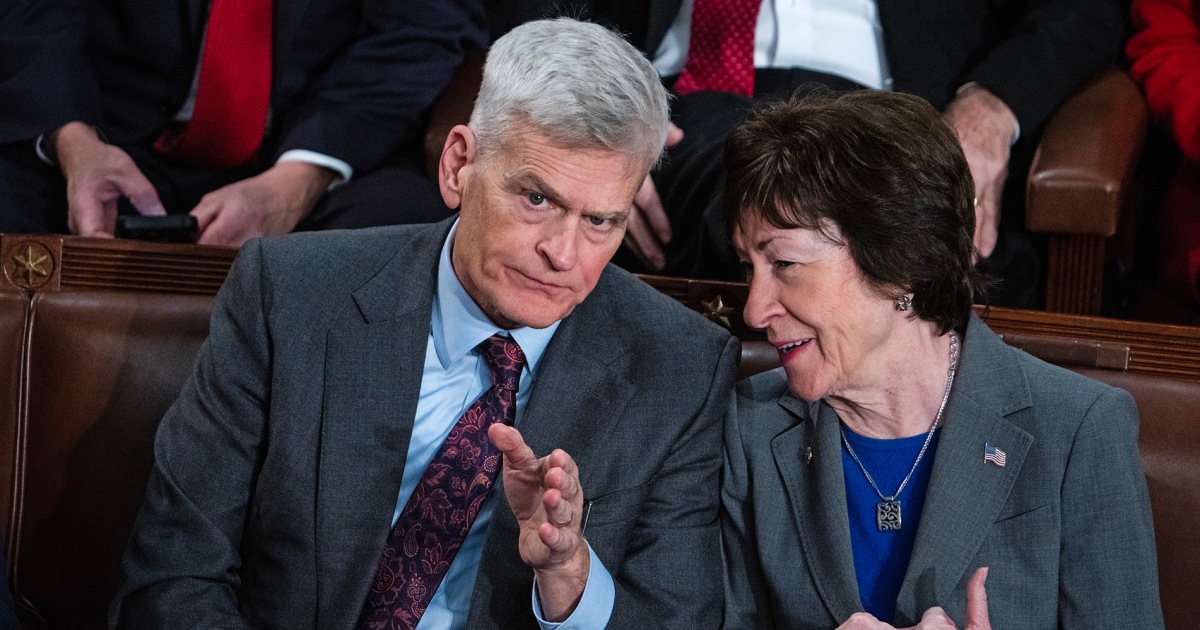Sen. Bill Cassidy, R-La., was concerned. A physician, Cassidy understands vaccines have saved millions of lives. He would have to decide whether Robert F. Kennedy Jr., the most prominent vaccine opponent in the United States and an all-around crank, should be confirmed to lead the Department of Health and Human Services.
Sen. Susan Collins, R-Maine, was also concerned. A member of the Senate Intelligence Committee for 12 years, Collins helps oversee the complex intelligence apparatus of the United States government. She would have to decide whether Tulsi Gabbard, someone with zero intelligence experience and a history of troubling statements and associations, should be director of national intelligence.
Lo and behold, the senators got over their concerns.
Yes, Cassidy and Collins were concerned. Reports from Capitol Hill indicated both nominees — especially Gabbard — might go down to defeat. “There are a lot of obvious issues” about Gabbard, Collins said before her confirmation hearings, one of the reasons she was “viewed as the Republican on the Intelligence Committee most likely to vote against Gabbard.” During Kennedy’s confirmation hearing, Cassidy seemed frustrated with Kennedy. “Your past undermining confidence in vaccines with unfounded or misleading arguments concerns me,” the senator said.
But lo and behold, the senators got over their concerns, just as their GOP colleagues have again and again when it came time to vote on the nominees President Donald Trump has sent to the Senate. Cassidy joined all his fellow Republicans on the Senate Finance Committee last week to approve Kennedy’s nomination, and Collins did the same on the Intelligence Committee. On Wednesday, Collins joined 51 other Republican senators in backing Gabbard’s nomination.
In short, Senate Republicans, including the members most eager to trumpet their independence, have abandoned their constitutional responsibility to “advise and consent,” and instead laid down and rolled over.
Traditionally, the Senate is known for its members’ self-importance and how fervently they protect their privileges and power. Since Republicans have a 53-47 majority today, any four of them could decide to vote against a nomination and force the president to choose a more qualified nominee.
But qualifications are beside the point with this president. In many cases, Trump’s nominees are indeed unqualified; anyone who supports them can’t honestly say they care at all whether the leaders of sprawling federal agencies have a clue what they’re doing. Defense Secretary Pete Hegseth, for instance, arguably has less relevant experience to lead the Pentagon than anyone who has ever held the job; he seems to have been nominated for one reason only: because Trump liked watching him on TV as a weekend host of “Fox & Friends.”
Hegseth’s nomination was the only one that garnered any GOP opposition so far (three Republicans voted no; Vice President JD Vance cast the tie-breaking vote). But some of Trump’s nominees, like Kennedy or Kash Patel for the FBI, aren’t just unqualified, they’re anti-qualified.
Lawmakers who trumpet their independence have to prove it when it actually matters.
Unlike, say, EPA Administrator Lee Zeldin or Transportation Secretary Sean Duffy, Patel and Kennedy do have some experience in the issues they’re now charged with overseeing. The problem, however, is that Kennedy’s health care “experience” consists of years of conspiracy theorizing and spreading misinformation. Likewise, Trump wants Patel to be FBI director not because he worked for the Justice Department and the National Security Council, but because he is a fervent MAGA loyalist who has every intention of turning the bureau into a weapon to be wielded against Trump’s enemies.
The same is true of Russell Vought, who will be taking the reins at the Office of Management and Budget, the same job he held in the first Trump administration. Vought was one of the architects of Project 2025; he believes presidents can simply ignore spending laws passed by Congress, wants to deploy the military against protesters, and has made no secret of his desire to lay waste to the federal workforce and destroy the careers of government employees who have devoted themselves to public service. “When they wake up in the morning, we want them to not want to go to work because they are increasingly viewed as the villains,” he said last year. “We want to put them in trauma.”
Was Collins, who chairs the Senate Appropriations Committee, concerned? Just a bit, but that did not keep her from voting to confirm him. “If there are impoundments, I believe it will end up in court, and my hope is the court will rule in favor of the 1974 Impoundment and Budget Control Act,” she said.
In fact, among everyone Trump nominated, it seems likely the only pick who will fail to take office will be former Rep. Matt Gaetz. In large part, that’s because unlike other nominees, Republicans knew him well enough to personally despise him. By contrast, no GOP senator raised any objections when seven separate Trump nominees wouldn’t say that they would refuse to follow an illegal order from the president.
And yes, the senators were subjected to an intense pressure campaign from the White House and its allies, which in today’s Republican Party carries the potential threat of violence against those who oppose Trump. Without downplaying the seriousness of that worry — or how horrifying it is that this is something politicians need to think about — lawmakers who trumpet their independence have to prove it when it actually matters. If they make a show of their reluctance to confirm every terrible nominee but nearly always wind up voting in the affirmative, maybe they aren’t so independent after all.
But in the end, all we’re left with is their “concern.” Which adds up to exactly nothing. So when the nominees these senators rubber-stamp do damage to the public interest — as they inevitably will — no one should forget who gave them the critical support they needed to get confirmed.

















